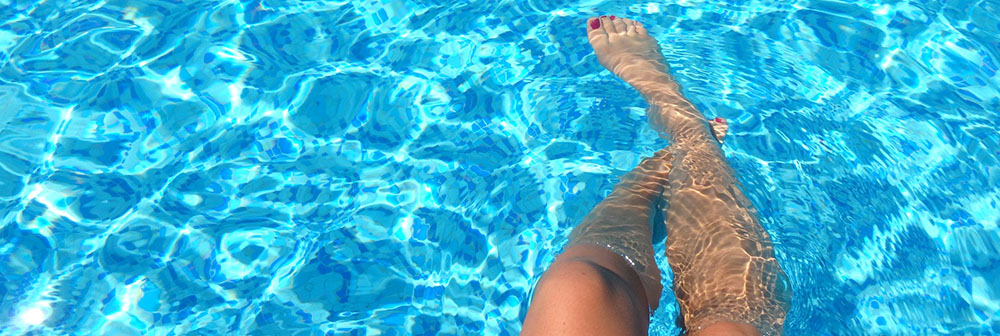Chlorine or Salt Water?

When deciding to install (or possibly convert) a pool, you’re bound to come across this long-discussed question. Both chlorine, and salt water pools have their advantages and disadvantages when it comes to cost, maintenance, and health, so you’ll have to compare each and decide for yourself which is best for you.
How do salt water pools work?
First let’s clear up a few misconceptions: salt water pools do contain chlorine. Chlorine is the chemical that kills bacteria in both types of pools, but instead of adding chlorine tablets, a salt water generator breaks down salt, which produces chlorine for the pool.
Is a salt water pool as salty as the ocean?
Let’s clear up another common misconception: salt water pools do not contain as much salt as many people think. A salt water pool only has about 3000 parts per million, below the threshold for human taste. Swimmers can keep their eyes open underwater and it will not leave residue on skin, clothes, or hair.
How much does a salt water pool cost?
Chlorine pools cost considerably less in the short term. But the cost of chemicals means that chlorine pools usually have a higher annual maintenance cost. You should factor your climate into your budget. In a warmer climate, where you use your pool more frequently, you may need to replace the pool’s generator more often, and a saltwater pool’s generator can be costly.
Lower maintenance costs mean that salt water pools are more affordable if you’re thinking long term. However, it’s never a bad idea to consult a pool care professional from your area.
How do you maintain a salt water pool?
Salt water pools require less maintenance than traditional chlorine pools. The latter needs weekly adjustments, and the pH levels require adjustment through the addition of chlorine tablets or sticks.
A salt water pool can go two weeks without any maintenance as its generator will measure and adjust the salt levels automatically.
Both pools require a shock treatment, which is the addition of more concentrated chlorine to a pool, to maintain chlorine levels and ward off algae. However, the traditional chlorine pool needs this more regularly. Salt water pools need this treatment only when algae begin blooming, or after particularly heavy rains.
Although your chlorine pool requires more attention, you’ll usually be able to resolve any issues yourself. Salt water pools tend to demand more complex solutions, so you might be forced to call in a pool care professional if you run in to trouble.
Are salt water pools better for your health?
Swimmers appreciate the lower chlorine concentration in salt water pools because it’s much gentler on their skin. If you, or anyone in your family, has allergies or skin problems, then this could be a compelling reason to choose a salt water pool.
Another consideration is the storage of pool supplies. Chlorine needs to be stored carefully to maintain its effectiveness, and to prevent potential hazards. It should always be stored in a cool, dry, and well ventilated area – we recommend getting into the habit of reading the storage instructions every time you buy chemicals for your pool.
Chlorine and salt both keep your water free from bacteria and algae, so your choice depends on your budget, maintenance plan, and safety considerations. In any case, happy swimming!
This Blog was Posted on June 21st, 2018
Any Offers, Prices or Product Line Ups Mentioned on this Page are Subject to Change Without Notice


